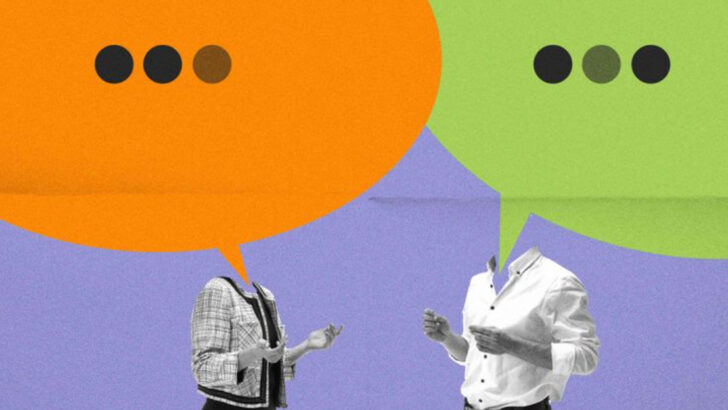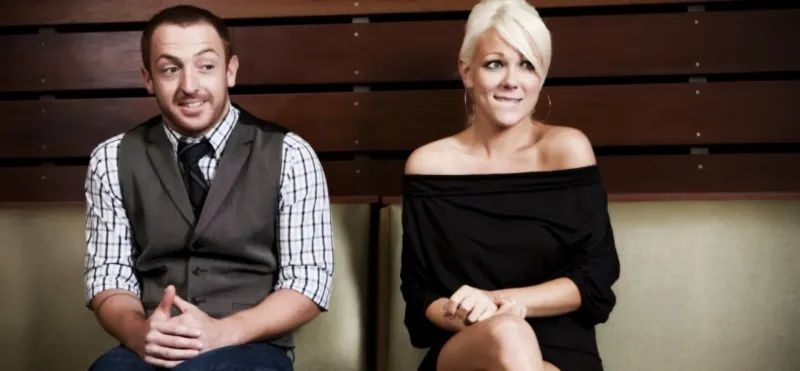Ever walk away from a convo feeling like you were acting in some awkward play instead of, you know… just being you? Yeah, same. It’s not just in your head. Sometimes our mouths go rogue—rambling weird filler, trying too hard, or defaulting to that fake-it-til-you-make-it vibe—all because we’re low-key anxious or just totally out of sync.
And here’s the kicker: these aren’t villain lines. Most of the time, we picked them up like armor. Little verbal safety nets to dodge silence, rejection, or just the weirdness of being seen. But the side effect? They can quietly shut down connection. We end up sounding off, even when our hearts are totally in the right place.
So, let’s rip the band-aid. Let’s get real (and yeah, a little cringey) about the things we say that quietly nudge people away—so we can start finding the messy, human words that actually bring them closer. No scripts. No polish. Just raw, real, us.
1. “No offense, but…”
You ever hear someone start with “No offense, but…” and immediately brace yourself for whatever comes next? It’s like someone announcing they’re about to step on your toes, but expecting you not to flinch. That phrase almost always signals something prickly, and it rarely lands gently.
The truth is, most people who say this mean well—they just want to soften the blow. But instead, it makes whatever comes after feel deliberate, like they knew it would sting and said it anyway. It leaves you wondering if they actually care how you feel, or if they’re just hiding behind politeness.
Here’s the thing: honesty doesn’t have to come with a warning label. If you actually care, you’ll find a way to be real without acting like you’re doing someone a favor. And if you have to announce “no offense,” maybe it’s worth asking why you need to say it at all.
2. “I’m just being honest…”
We all know someone who uses “I’m just being honest…” like a hall pass for bluntness. Sometimes, it feels less like truth-telling and more like an excuse to say something nobody asked for. The words hang in the air a little too long, making the room colder.
What’s wild is, a lot of us learned to blurt out hard truths because we thought it made us brave or authentic. But real honesty isn’t about dropping uncomfortable bombs. It’s about timing, care, and asking yourself if sharing serves anyone but you.
People sense when you’re using honesty as a shield. They back away. Suddenly, it doesn’t matter what you said—just how little you seemed to care. If your truth comes wrapped in barbed wire, maybe it’s not as brave as you think.
3. “I hate drama…”
Here’s one that gets tossed around like confetti. Funny thing is, people who shout this from the rooftops attract more chaos than anyone else. Maybe it’s bad luck, or maybe it’s something deeper they haven’t owned up to.
The phrase feels like a badge—“Look at me, I’m above it all.” But for anyone listening, it can reek of self-deception. It’s a way to distance yourself from messy feelings, but it also creates distance between you and everyone else.
It’s okay to dislike conflict. Saying you’re not about drama doesn’t actually protect you from it—if anything, it calls more attention to it. Now and then, the most honest thing to admit is that we’re all a little messy, and that’s fine.
4. “Just kidding…”
There’s a moment after you say something and the laughter doesn’t come. So you add, “Just kidding…” hoping to rewind time. It’s a safety net, but it rarely makes anyone feel safer.
This phrase gets used to cover up words that hit too hard or jokes that fell flat. Instead of being honest about the misstep, it’s like trying to erase the sting. But the truth is, most people remember the first part, not the walk-back.
If you catch yourself reaching for “just kidding,” maybe pause and own the awkward. A real apology—“Hey, that was off”—goes further. There’s more courage in admitting you fumbled than pretending you never threw the ball.
5. “I don’t want to sound rude, but…”
Ever notice how this is a warning bell for incoming bluntness? It’s the social equivalent of, “I’m about to cross a line, but please don’t call me on it.” Half the time, it makes things even weirder.
People use this as a shield, hoping the words that follow won’t get held against them. But it doesn’t actually soften the impact—it just leaves everyone bracing for impact. The phrase ends up sounding less like concern, and more like someone ducking responsibility.
If you’re worried about sounding rude, maybe you already know it’s risky. Try pausing, or rephrasing. Owning your words is scarier, but it’s a lot more real than hiding behind disclaimers.
6. “Whatever…”
“Whatever…” rolls out when patience runs dry, or you just want to vanish from the conversation. There’s a finality to it—a wall goes up, even if you don’t mean to shut people out completely.
Perhaps, it’s a signal that you’re overwhelmed, or that you don’t have the words for what you feel. But from the outside, it reads as careless, even cold. People hear it and assume you’re done, not just with the talk but with them.
It’s easy to forget how heavy a single word can land. If you’ve used “whatever” as a shield, you know—it doesn’t actually protect you from anything. If you’re hurting, say so. If you need space, ask for it. Anything is better than disappearing.
7. “I guess…”
“I guess…” sneaks into conversations like a whisper. It’s a way out when you’re not sure about your answer—or when you’re afraid your real thoughts won’t land well. The phrase lacks conviction, and people notice.
When you use it often, others start to wonder if you actually have opinions or if you just try to keep everyone else comfortable. It’s hard to trust or connect with someone who never seems sure of anything.
Confidence doesn’t mean having all the answers. Sometimes, it’s just saying, “I don’t know,” o “Here’s what I think.” You don’t have to have it all figured out. But you do have to show up honestly—fog and all.
8. “I’m not one to gossip, but…”
You know the friend who always claims, “I’m not one to gossip, but…” and then spills the juiciest story anyway? It’s almost a ritual—disavow gossip, then serve it up fresh. The words say restraint; the actions say otherwise.
It’s a way of pretending you’re above the drama, but your curiosity couldn’t help itself. People pick up on the contradiction. Suddenly your credibility starts to fray, even if you just try to bond over a little shared scandal.
If you’re going to share, own it—don’t sugarcoat with disclaimers. The world doesn’t need another fake saint. Lean into the mess, or let it go. At least then, everyone knows where you stand.
9. “I don’t mean to interrupt, but…”
There’s a split second after someone says this where everyone freezes. The confession is polite, but it’s still an interruption, and we all know it. It’s like apologizing for stepping on a foot, then doing it anyway.
Occasionally, you just can’t wait your turn, especially when nerves make you fear you’ll forget what you were going to say. But stacking a polite phrase on top doesn’t erase the rudeness. It can even make you look out of touch with the flow of conversation.
If you need to jump in, try a simple, “Can I add something?” Or—if you always interrupt—practice holding back. Listening is underrated, and being present says more than any apology ever could.
10. “I could be wrong, but…”
This is the verbal version of tiptoeing. You’re putting your thoughts out there, but not committing. It feels like you protect yourself from being judged, but it also makes people wonder what you actually believe.
People want to connect with someone who has convictions, even if they don’t always agree. Constantly hedging your statements makes you seem less trustworthy—even fake. It’s not confidence to never risk being wrong; it’s just self-protection wearing a polite mask.
Try saying what you mean, even if your voice shakes. You’ll find people respect you more for it. Vulnerability is a better look than false humility.
11. “Just trying to help!”
It’s a classic move: you give advice nobody asked for, and when it backfires, you throw up your hands—“Just trying to help!” It comes off like you’re above the problem, when really, you might just be uncomfortable with someone else’s pain.
Offering help isn’t the issue. The trouble comes when you use it to dodge the messiness of someone else’s feelings, or to keep yourself feeling in control. People hear it and feel dismissed, not supported.
In certain moments, the best help is just listening. You don’t have to fix everything. Let people have their moment, even if you can’t make it better.
12. “That’s interesting…”
There’s a certain way this lands that makes everyone suspicious. It sounds polite, but if your eyes glaze over or your foot starts tapping, people see right through it. The words feel like a placeholder for actual engagement.
Most of us use it when we don’t know what else to say, or when we want to move the conversation along without hurting anyone’s feelings. But over time, it comes across as distant or even patronizing.
If you’re genuinely curious, ask a follow-up question. If not, it’s okay to admit you don’t have much to add. People connect to honesty, not awkward filler.
13. “It is what it is.”
It’s the only thing left to say when life gets weird or hard. But after a while, it starts to feel like a no-exit road—like you’re closing the door on your own feelings.
People use this phrase to avoid deeper conversations or to mask disappointment. It makes you seem checked out or apathetic, even if you just try to cope. Friends might stop sharing real stuff with you, afraid you’ll brush it off.
You don’t have to fix everything, but don’t let resignation be your default. If you care, show it. People need connection, not just acceptance of fate.
14. “Let’s agree to disagree.”
When someone drops a “Let’s agree to disagree,” it’s usually the conversational escape hatch. It sounds diplomatic, but it means, “I’m done talking about this.” It can feel like you’re more invested in ending conflict than understanding each other.
In some cases, it’s the only way to keep the peace. But if you use it too often, you risk looking disengaged, uninterested in growth, or unwilling to get uncomfortable.
Real connection isn’t always neat. Here and there, it means sticking around for the messy parts. Don’t be afraid to stay in the ring, even if it gets awkward. That’s where honesty lives.















